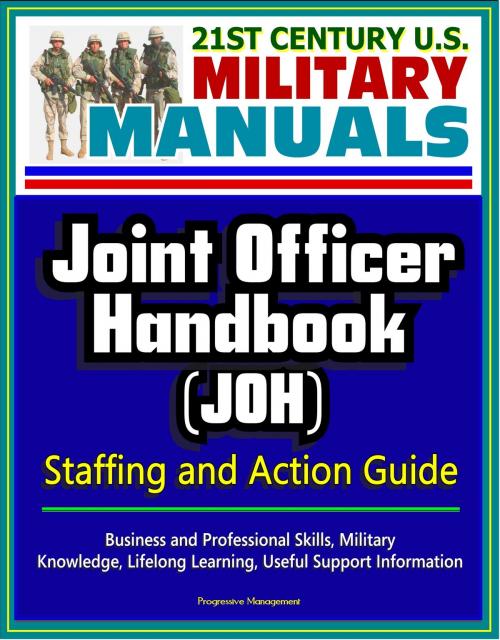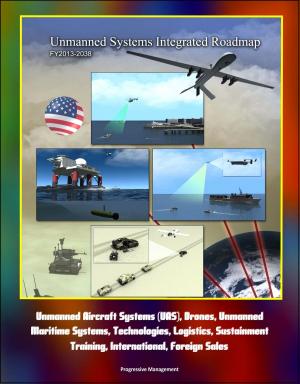21st Century U.S. Military Manuals: Joint Officer Handbook (JOH) Staffing and Action Guide - Business and Professional Skills, Military Knowledge, Lifelong Learning, Useful Support Information
Nonfiction, History, Military, United States| Author: | Progressive Management | ISBN: | 9781311766946 |
| Publisher: | Progressive Management | Publication: | August 24, 2014 |
| Imprint: | Smashwords Edition | Language: | English |
| Author: | Progressive Management |
| ISBN: | 9781311766946 |
| Publisher: | Progressive Management |
| Publication: | August 24, 2014 |
| Imprint: | Smashwords Edition |
| Language: | English |
The Joint Officer Handbook (JOH) reflects input from serving action officers and senior leaders with the most current joint information available for managing staff activities. Included, as identified by senior leaders across the combatant commands, are competencies and behaviors of highly effective and successful joint staff officers, these provide a roadmap for career self-development.
Today's joint environment is fast paced and demanding. To work effectively and meet the diverse demands facing our combatant commands, joint staff officers need to be able to quickly find, access, and apply information in the conduct of daily duties.
For those new to the joint environment and staff assignments, the JOH provides guidance, tips and useful general information. It is designed to be practical, portable, and quickly accessible, as new joint officers learn about their command.
Introduction * Section 1 - Business and Professional Skills * Section 2 - Interpersonal Skills Requirements * Section 3 - Joint Military Knowledge * Section 4 - Critical Mission Areas for the 21st Century * Section 5 - Lifelong Learning * Section 6 - Useful Support Information and References
Section 1 - Business and Professional Skills * 1.1 Job Knowledge: Roles and Responsibilities of a Joint Staff Officer * 1.1.1 The Model Staff Officer * 1.1.2 The Joint Staffing Process (JSAP) * 1.1.3 Combatant Command Internal Taskings * 1.2 Developing Work Products * 1.3 Time Management Requirements * 1.3.1 Tools * 1.3.2 Managing Daily Tasks * 1.4 Analytical and Critical Thinking Skills * 1.4.1 Problem Solving * 1.4.2 Joint Staff Officer Critical Thinking Requirements * 1.4.3 The Ideal Critical Thinker * 1.5 Communicating Effectively at Executive Levels and Across a Diverse Workforce * 1.5.1 Working with People * 1.5.2 Effective Writing Skills * 1.5.3 Effective Briefing Skills * 1.5.4 Practicing Good E-mail Etiquette * 1.5.5 Facilitating Effective Meetings * 1.5.6 Working with the Public Affairs Office * 1.6 Understanding the Combatant Command Workforce and Partner Relationships * 1.6.1 United States Agency Partners * 1.6.2 Interagency Partners * 1.6.3 The National Guard and Reserves * 1.6.4 Multinational Partners * 1.6.5 DOD Government Civil Servants - General Schedule (GS) * 1.6.6 Working with Government Contractors * 1.6.7 Working with the other Services * 1.7 Maximizing Technology Software and Hardware Capabilities in the Combatant Commands. * Section 2 - Interpersonal Skills Requirements * 2.1 Building Constructive Work Relationships in a Joint Environment * 2.2 Teambuilding * 2.2.1 Principles of Teamwork * 2.2.2 Commander's Decision Cycle * 2.3 Coordinating with other Directorates * Section 3 - Joint Military Knowledge * 3.1 Foundational Joint Knowledge * 3.1.1 Organization for National Security * 3.1.2 The National Intelligence Community * 3.1.3 Department of Defense Organization * 3.1.4 The Joint Staff * 3.1.5 A Traditional Combatant Command Joint Staff Organization * 3.1.6 Planning, Programming, Budgeting and Execution System (PPBES) * 3.1.7 Types of Appropriations * 3.1.8 Joint Strategic Planning System (JSPS) * 3.2 Joint Publication System * 3.3 Joint Logistics * 3.4 Understanding the Organizations and Missions of the Combatant Commands * 3.5 The Unified Combatant Commands * 3.5.1 United States Africa Command (USAFRICOM) * 3.5.2 United States Central Command (USCENTCOM) * 3.5.3 United States European Command (USEUCOM) * 3.5.4 United States Northern Command (USNORTHCOM) * 3.5.5 United States Pacific Command (USPACOM) * 3.5.6 United States Southern Command (USSOUTHCOM) * 3.5.7 United States Special Operations Command (USSOCOM) * 3.5.8 United States Strategic Command (USSTRATCOM)
The Joint Officer Handbook (JOH) reflects input from serving action officers and senior leaders with the most current joint information available for managing staff activities. Included, as identified by senior leaders across the combatant commands, are competencies and behaviors of highly effective and successful joint staff officers, these provide a roadmap for career self-development.
Today's joint environment is fast paced and demanding. To work effectively and meet the diverse demands facing our combatant commands, joint staff officers need to be able to quickly find, access, and apply information in the conduct of daily duties.
For those new to the joint environment and staff assignments, the JOH provides guidance, tips and useful general information. It is designed to be practical, portable, and quickly accessible, as new joint officers learn about their command.
Introduction * Section 1 - Business and Professional Skills * Section 2 - Interpersonal Skills Requirements * Section 3 - Joint Military Knowledge * Section 4 - Critical Mission Areas for the 21st Century * Section 5 - Lifelong Learning * Section 6 - Useful Support Information and References
Section 1 - Business and Professional Skills * 1.1 Job Knowledge: Roles and Responsibilities of a Joint Staff Officer * 1.1.1 The Model Staff Officer * 1.1.2 The Joint Staffing Process (JSAP) * 1.1.3 Combatant Command Internal Taskings * 1.2 Developing Work Products * 1.3 Time Management Requirements * 1.3.1 Tools * 1.3.2 Managing Daily Tasks * 1.4 Analytical and Critical Thinking Skills * 1.4.1 Problem Solving * 1.4.2 Joint Staff Officer Critical Thinking Requirements * 1.4.3 The Ideal Critical Thinker * 1.5 Communicating Effectively at Executive Levels and Across a Diverse Workforce * 1.5.1 Working with People * 1.5.2 Effective Writing Skills * 1.5.3 Effective Briefing Skills * 1.5.4 Practicing Good E-mail Etiquette * 1.5.5 Facilitating Effective Meetings * 1.5.6 Working with the Public Affairs Office * 1.6 Understanding the Combatant Command Workforce and Partner Relationships * 1.6.1 United States Agency Partners * 1.6.2 Interagency Partners * 1.6.3 The National Guard and Reserves * 1.6.4 Multinational Partners * 1.6.5 DOD Government Civil Servants - General Schedule (GS) * 1.6.6 Working with Government Contractors * 1.6.7 Working with the other Services * 1.7 Maximizing Technology Software and Hardware Capabilities in the Combatant Commands. * Section 2 - Interpersonal Skills Requirements * 2.1 Building Constructive Work Relationships in a Joint Environment * 2.2 Teambuilding * 2.2.1 Principles of Teamwork * 2.2.2 Commander's Decision Cycle * 2.3 Coordinating with other Directorates * Section 3 - Joint Military Knowledge * 3.1 Foundational Joint Knowledge * 3.1.1 Organization for National Security * 3.1.2 The National Intelligence Community * 3.1.3 Department of Defense Organization * 3.1.4 The Joint Staff * 3.1.5 A Traditional Combatant Command Joint Staff Organization * 3.1.6 Planning, Programming, Budgeting and Execution System (PPBES) * 3.1.7 Types of Appropriations * 3.1.8 Joint Strategic Planning System (JSPS) * 3.2 Joint Publication System * 3.3 Joint Logistics * 3.4 Understanding the Organizations and Missions of the Combatant Commands * 3.5 The Unified Combatant Commands * 3.5.1 United States Africa Command (USAFRICOM) * 3.5.2 United States Central Command (USCENTCOM) * 3.5.3 United States European Command (USEUCOM) * 3.5.4 United States Northern Command (USNORTHCOM) * 3.5.5 United States Pacific Command (USPACOM) * 3.5.6 United States Southern Command (USSOUTHCOM) * 3.5.7 United States Special Operations Command (USSOCOM) * 3.5.8 United States Strategic Command (USSTRATCOM)















